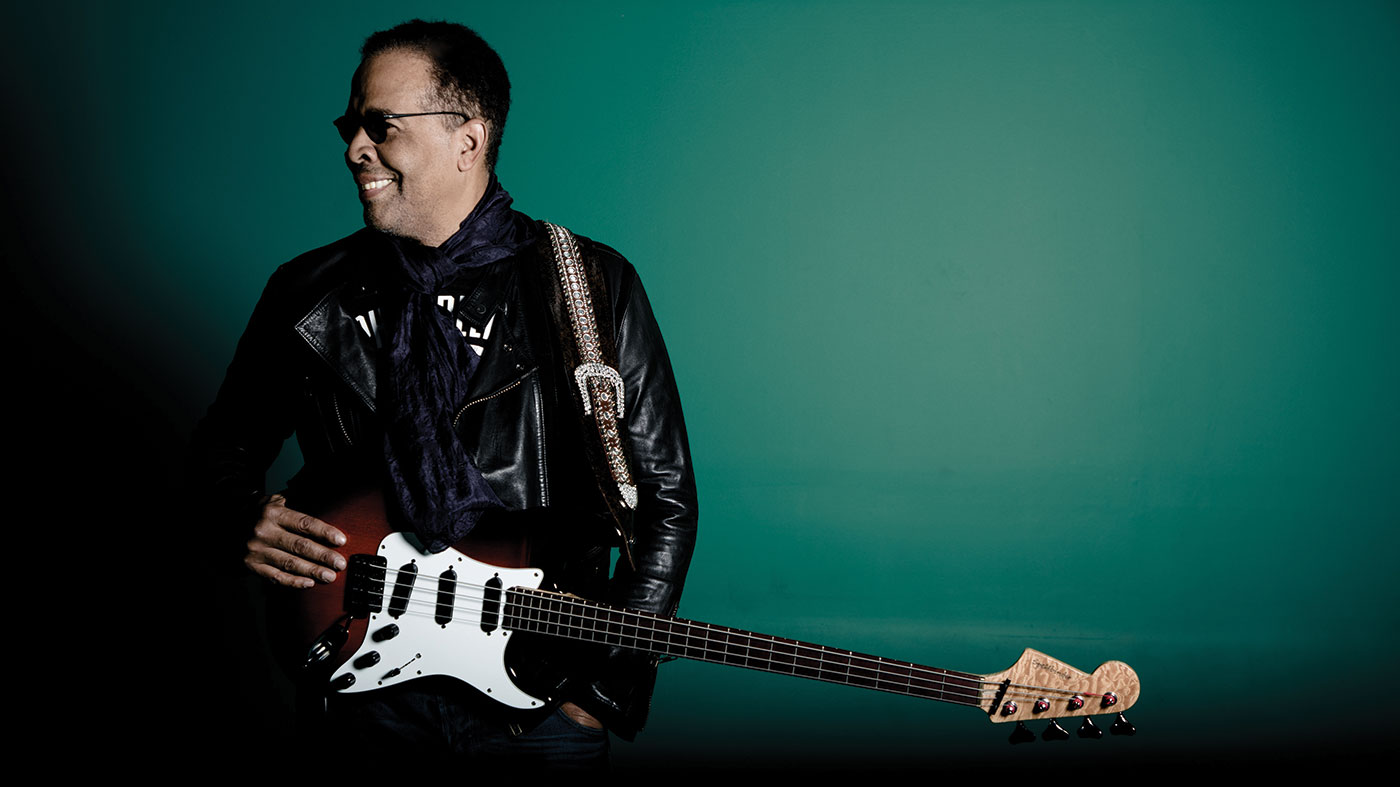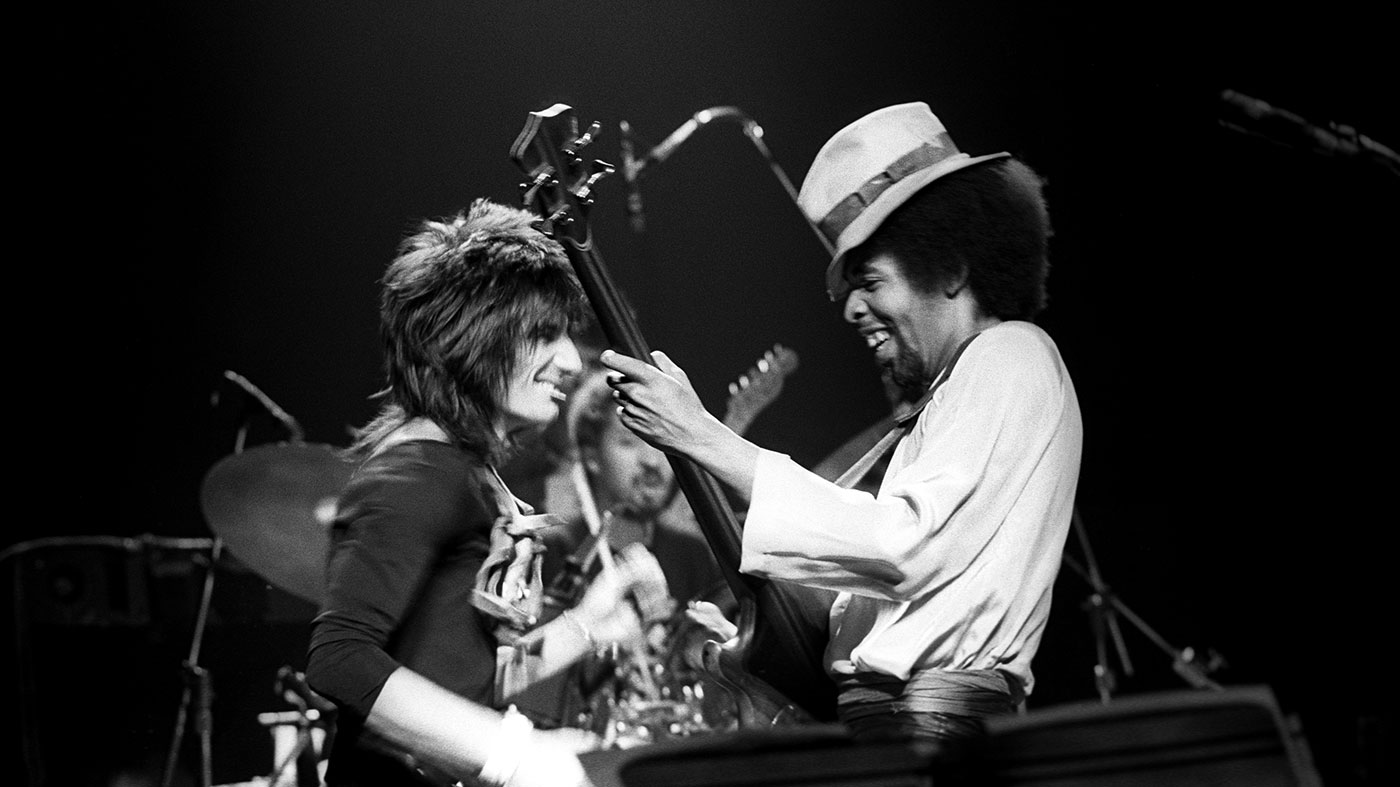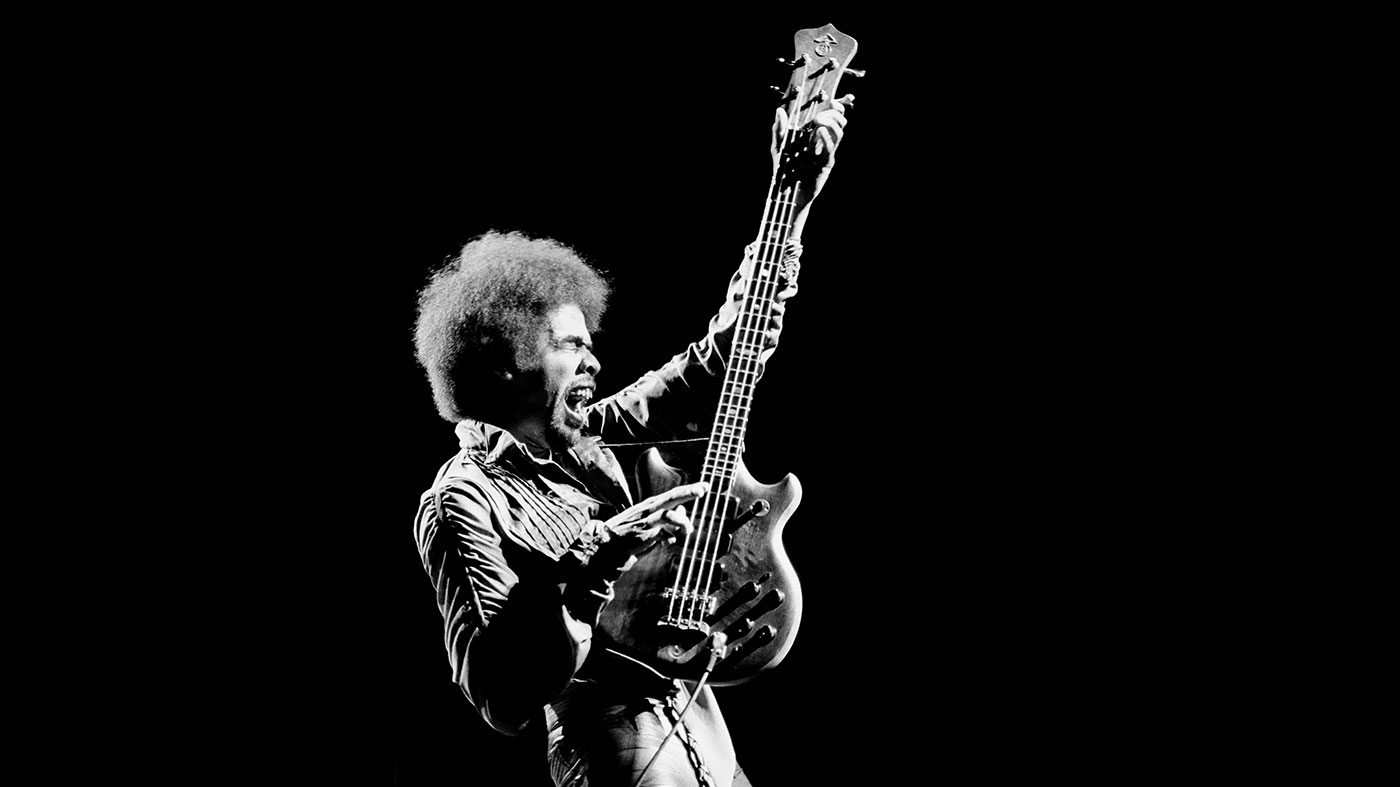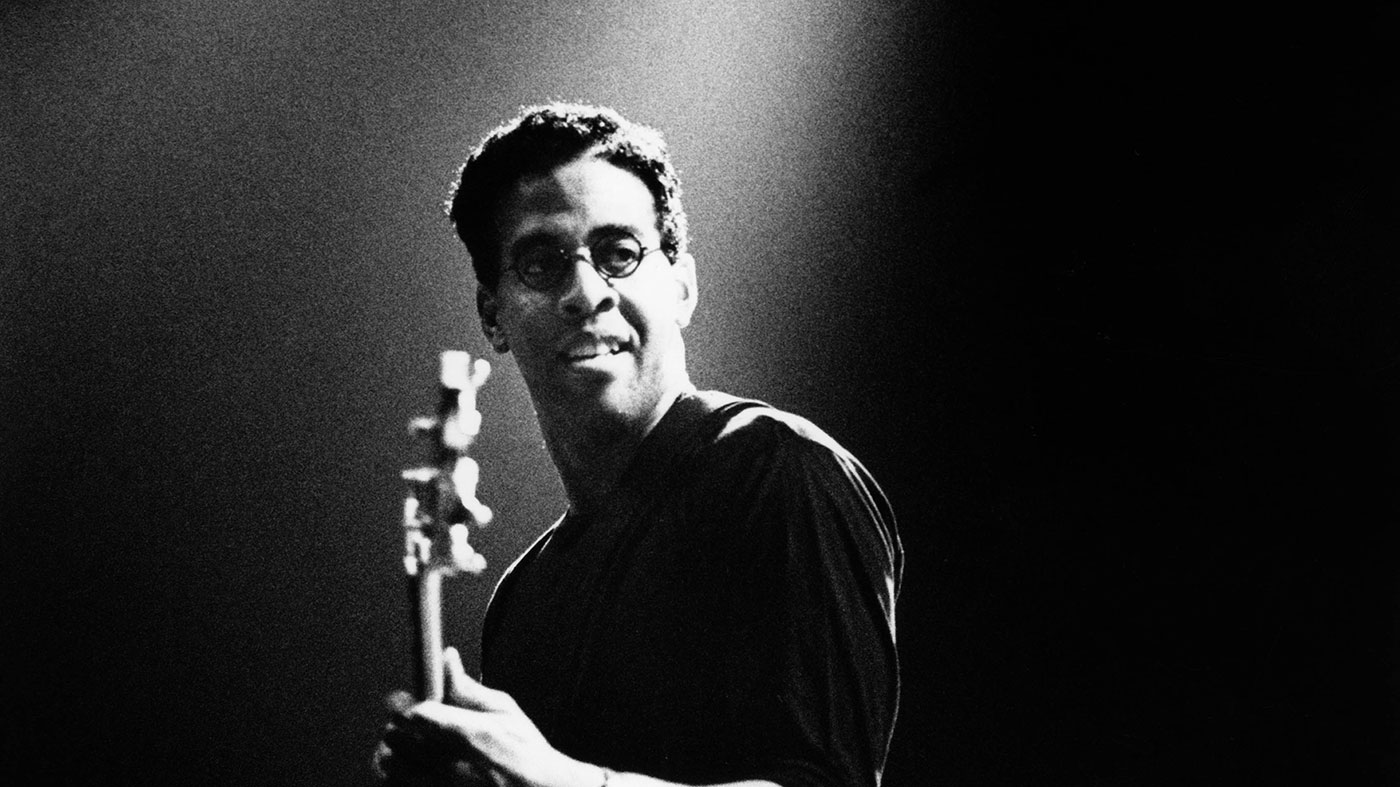Stanley Clarke: "I built a new bass that looks like a Stratocaster; Fender is going to release it"
The Return To Forever bass legend on his surprising new model, gear secrets and spreading The Message

Want all the hottest music and gear news, reviews, deals, features and more, direct to your inbox? Sign up here.
You are now subscribed
Your newsletter sign-up was successful
There are good bassists, and there are great bassists - and there’s Stanley Clarke, veteran of close to half a century as bass player, composer, bandleader, band-member and all-round guru to our low-frequency community and far beyond.
Now aged 67 and as focused as ever, the fourtime-Grammy-winning pioneer is talking to us today about his new album, The Message, written and recorded in France and Belgium with a young band of incredible talent.
As with pretty much everything Clarke has released since he first came to the public’s attention in the early '70s, his new album isn’t just another collection of tunes. Appropriately given its title, The Message is Clarke’s implicit appeal to the listener to listen up, wise up and pay attention to the state of play in today’s troubled world.
Assisted by a stellar cast of musos, including beatboxer Doug E. Fresh and trumpeter Mark Isham as well as the core band of keyboardists Cameron Graves and Beka Gochiashvili and drummer Mike Mitchell, Clarke delivers music that spans a wide range of genres.
If you want synthesiser-heavy space jams straight from Clarke’s Return To Forever days, they’re here; solo compositions on electric and acoustic bass abound; and musical virtuosity sits side by side with economical, stripped-down simplicity, just as it should.
Where else would you find an arrangement of J.S. Bach’s ‘Cello Suites, No. 1’ next to a beatboxed salute to the friends who Clarke has lost in recent years, his frequent collaborator George Duke among them? Let’s hear what our man Stan has to say…
Congratulations on the new album, Stanley.
Want all the hottest music and gear news, reviews, deals, features and more, direct to your inbox? Sign up here.
“Thanks! The kids did a great job and played well. It just came together - it’s actually a European record in many ways, because we wrote it and recorded it over there.”
What’s that bass you’re holding in the image above?
“That’s a sneak preview of a bass that Fender is going to release. I’ve been playing Alembic all my life, but I’ve also been building basses with a friend of mine in New York for quite some time, and we release them from time to time under the company name Spellbinder.
“The new bass looks like a Fender Stratocaster, so we took it to Fender and they loved it. It has a reverse headstock, like a Jimi Hendrix bass, which gives the E string a longer scale by the time it gets to the tuning peg. When you pull it, it’s a little looser, and the sound is a little different. It’s a very cool bass. Fender is considering the model name right now, but we would like the world Strato in there somewhere.”

Signature sounds
What was the philosophy behind the design?
“What I wanted to make clear with Fender is that it isn’t a replacement bass; most guys that make basses say, ‘Okay, you can take this bass and get rid of your Warwick or your Fender or whatever.’ This is an actual addition, much like a guitar player has a Strat and maybe a Les Paul and this and that. With this bass you can play basslines and it sounds great, or you can really play solos with it.”
Sounds like a lot of us would enjoy playing it.
What’s cool about bass players is that they come from all different starting points
“What’s cool about bass players is that they come from all different starting points. Some guys start out on upright bass and move to electric; others are guitarists, and move to bass.
“You can tell when a guy comes from guitar world, because he’s very heavy, and almost lopsided; he can play great solos and chords, but when it comes to basslines, he’s weak.
“Then you have the other type of bass players, who are really strong with basslines and what have you, but maybe they didn’t do enough homework on the subject of chords and scales and all that stuff. I think both guys will enjoy this bass. Personally, I enjoy the bass universe right now because of all the different types of players.”
That’s one of the things I love about your new album. Whether we’re talking about tone, sustain or note choices, there are tons of different kinds of bass on there.
“Yeah, yeah! It’s fun for me because the universe has really expanded and exploded since the days of the original guys who go all the way back, like James Jamerson, up through Jaco Pastorius and myself. I wish Jaco was still around to check it out, he’d probably really enjoy it. All the older guys too; Jeff Berlin, Anthony Jackson, Chuck Rainey, and then you’ve got the younger guys like Marcus Miller and Victor Wooten - the turbo bass player!”
The man is unstoppable.
“I like Victor because he can go on the stage alone. He’s got a good 35 minutes in him, without any other accompaniment. If you go on stage in front of a couple of thousand people, with just a bass and some higher techniques, can you do a show? How long will you last before people yell you off the stage? Victor’s got at least 35 minutes. I can do 35 or 40 minutes, but I can pull out both basses, you know. That’s the test. At that point you have to have all the skill sets. You’ve got to be able to play great basslines, solo, chords, and be able to speak on the mic.”

Gear talk
A lot of young players appreciate the importance of that global approach to bass, judging from the bassists we interview.
“You know, there really isn’t a book or a bible that codifies all the various techniques that we do. It would be nice if a kid who was 13 or 14 years old could pick up a book that has everything - how you slap, how you play chords, how you play Giant Steps, how you play in a country and western band... just everything together. That would be really something.”
Let’s talk gear. Has your signature Alembic bass changed much over the years?
“The only thing that the Alembic people did for me was put a boost there. The bass is pretty much standard, but there’s a little switch that they put in, real close to the five-pin input. It gives it a quick boost of 5dB, I think. Other than that, it’s pretty simple.”
Did you use amps in the studio, or go straight to the desk?
For years I’ve been using Fairchild limiters. It’s a limiter that can handle the dynamic range of the electric bass
“It varies, but on this album I decided it was best just to go straight in. The song The Message has a lot of sustain on it because it’s really just solo bass with some synthesisers thrown in.
“For years, I’ve been using Fairchild limiters, and when I worked with [famed Beatles/Bowie producer] Ken Scott on my first three solo records, I used the old Fairchilds going in and coming out. It’s a limiter that can handle the dynamic range of the electric bass, and for some reason, with that limiter you don’t hear the dramatic effects that you hear with some others. Even the plugin version of the Fairchild limiter sounds good, so that’s what we used. At the Village, the studio I used for the mix, they had some old Fairchild limiters in there. They were pretty clean, too.
“For electric bass I use Rotosound and DR strings, and for acoustic bass I go with Thomastik, out of Austria.”
Are you still using amps for live shows?
“Yes, I use Ampeg. One of the great things about that company is that they’re everywhere. We play a lot of small venues with backline, and everybody has Ampeg. I like their cabs because they have a warmer, fatter sound, and the Alembic bass likes that.”
What else is in the chain?
“I’ve been using EBS pedals for a long time, and I love them. I think they’re the best. They can fall, or you can step on them; they’re really roadworthy and they sound great. These guys are a real class A company; they’ve been taking care of me for years. Their Microbass is the best thing for acoustic bass; it’s the secret of my live acoustic bass sound. It handles everything - it’s an EQ, a direct box, a preamp.”
There’s nothing you can’t do with it. Do you have a lot of bass gear?
“I have bass gear in a storage place, for sure, but I got rid of a lot of the electric basses; at one point I had over 100 of them. I thought ‘Why do I need all these? They’re just collecting dust’ so I gave some to friends of mine, and got rid of others, and I’m planning to get rid of even more.
“I also have many, many amplification systems, and I don’t know what to do with that stuff. Warwick sent all these cabinets over, and I was so happy, because I loved them - but you know what, I travel a lot, so the only chance I ever have to use them is in LA.”

The message
You’re extremely prolific. Does songwriting inspiration just flow into you, or is it a craft that you work on?
“Well, actually both answers are true. It does flow, and I do have to put it down. Some guys, like Chick Corea for example, have the ability to write music down on the page as it’s flowing. For me, there’s a little gap there. Not much, but the process of getting it down is a little slower for me. The good thing is that I use musicians who read traditional notation, as well as musicians who don’t read at all. The brilliance depends on the person I’m dealing with.”
How did you assemble the songs for the new album?
As musicians, we have the luxury of globetrotting and seeing the planet as smaller than a guy would who’s lived in a small town all his life
“Usually, I’ll just make a demo of the song, with all the parts, and hand it over to everyone, or maybe there’ll be a chart and I’ll give that to them. This time, it was really interesting; it was the first album I’d been involved with for a long time, that had my name on the cover, where I really got into working with the guys.
“We were in Paris for a week and everybody wrote music and recorded it in Logic. Later we went over to Brussels in Belgium and recorded in a studio, so it came together without a lot of music being written down on paper.”
So what is the message of The Message?
“The message is one that people have been trying to disseminate since the beginning of time. It’s real simple; just a message of love.
“As musicians, we have the luxury of globetrotting and seeing the planet as smaller than a guy would who’s lived in a small town all his life. There’s at least 50 skirmishes or battles going on all over the world; it’s amazing how much violence there is. Whether it’s land, power, money, religion, we human beings can sometimes get caught up in that stuff and forget who we really are. Music reminds us who we are.
“Take three or four guys from different demographics in a room, and if they’re all fans of Metallica, say, or they’re at a Metallica concert and they’ve all got their fists raised in the air, at that moment there’s brotherhood between those people. That’s one of the beautiful things about music, and it’s a form of love.”
In what way?
“I like the definition of love as degrees of affinity, where people get closer. It’s just people being together in brotherhood. So if someone listens to a song on my album and feels a little peace in their heart for that moment, and a little humanity in their world, then my job is done. It’ll take a long, long time to get the job done, but someone might as well start it!”
The Stanley Clarke Band’s album The Message is out now on Mack Avenue.

